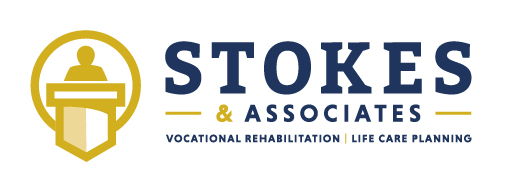Incorporating Telehealth into Modern Vocational Rehab and Life Care Planning (Part 2)
Be honest. Think back to January of 2020. Did you know what Zoom was? Maybe you had heard of Skype? Perhaps you had used Facetime? Since the Covid-19 pandemic, Zoom has officially become synonymous with videoconferencing, much like ‘Kleenex’ is used to signify something you sneeze into and ‘Googling’ is used to represent searching on the internet. At Stokes & Associates, we have been advocating the use of secure videoconferencing to conduct vocational assessments and life care plan evaluations since 2010. Since we last wrote about the issue in 2016, the worldwide pandemic has only accelerated the general public’s comfort with videoconferencing as an alternative to in-person meetings. From primary care visits to the in-home schooling of our children, videoconferencing has become ubiquitous.
Once the national state of emergency was declared in March of 2020, the Department of Health and Human Services (HHS) and the Centers for Medicare & Medicaid Services issued guidance to make healthcare services easier. For example, these agencies eased HIPAA regulations, waived regulatory changes to ensure expanded reimbursement for services, altered licensing requirements to allow practitioners to provide services over state lines, and authorized providers to prescribe controlled substances via telehealth. In addition, professional organizations like the American Psychological Association (APA) also issued guidance regarding the use of online assessment that allowed psychologists and other behavioral health providers the opportunity to provide remote testing services.
Is telehealth here to stay? Results from a recent massive study of over 36 million adults published in the JAMA Network suggest significant increases in the use of telehealth that support its popularity. Data were analyzed from working-age individuals enrolled in private health plans from March 2019 to June 2020 and yielded impressive results:
Telehealth use increased from .3% of provider visits in 2019 to 23.6% in 2020.
In-person visits decreased by 37%
Behavioral health visits were virtual 46.1% of the time, while medical visits were 22.1%
Medical care costs decreased by 15% per enrollee from 2019 to 2020
The federal courts also followed suit when the Judicial Conference, the administrative policy-making body for the federal courts, found on March 29, 2020, under the Coronavirus Aid, Relief, and Economic Security Act (CARES Act), that “emergency conditions due to the national emergency declared by the President concerning COVID-19 will materially affect the functioning of the federal courts….to temporarily authorize the use of video or telephone conferencing…” This authorization spread throughout the federal and state systems, with U.S. Patent and Trademark Office accommodating video hearings, County registrars offering video marriage licenses, and Federal and State Supreme Courts hearing arguments via video conferencing. For detailed information regarding how specific state courts use technology to operate, check out the National Center for State Courts Data Visualizations.
We have appeared at in-person courtroom trials and continue to provide virtual testimony in many states. Although there are some ethical positions articulated by the vocational and life care planning credentialing bodies and professional organizations, development in technology seems to be moving faster than policymakers. Due to the nature of our professional methodology, we can collect vital information from some evaluees via videoconferencing when in-person interviews are not possible or preferred. By continuing to leverage video capabilities, we have been able to provide the full slate of vocational and life care planning services during the pandemic. We intend to encourage the continued use of remote evaluations to keep costs down and retain other efficiencies such as greater choice for evaluation scheduling options and online vocational testing.
To strategize with one of our vocational rehabilitation or life care plan experts at Stokes & Associates, please call Dave Barrett at 504-454-5009, visit our website, www.stokes-associates.com, or e-mail dbarrett@stokes-associates.com.
Larry S. Stokes, Ph.D.
Aaron Wolfson, Ph.D.
Lacy Sapp, Ph.D.
Todd Capielano, M.Ed., LRC, CRC, LPC, CLCP
Ashley Lastrapes, Ph.D., CRC, CCM, CLCP, LPC, LRC
Brandy Bradley, MHS, CRC, LRC, CLCP
Elizabeth Peralta, M.Ed., LRC, CRC, CLCP
